.
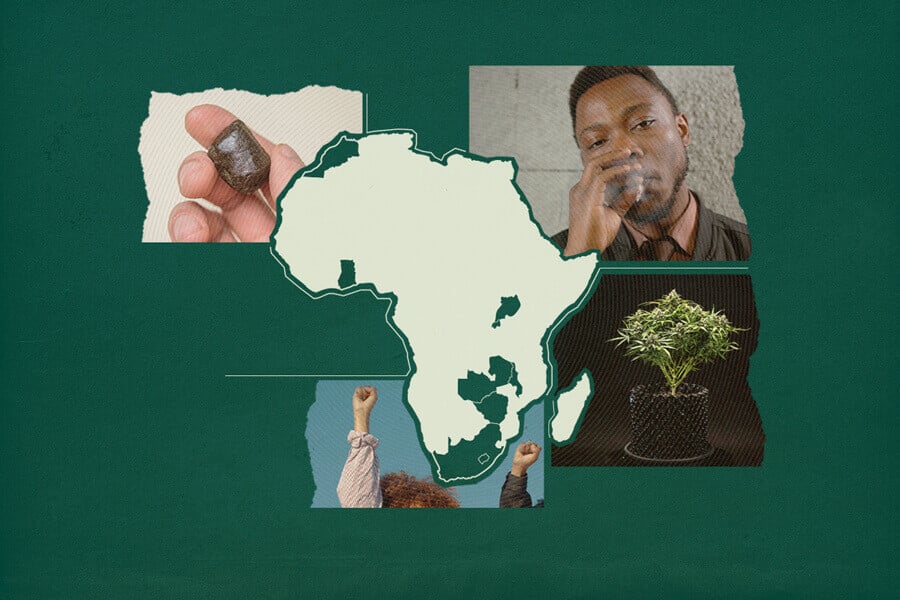
Cannabis Legislation in Africa: The Latest News
It is possible to legally grow, process, and export cannabis in mulitple African countries. But who does it benefit—the locals, or European and North American corporations?
The legal status of cannabis in each of Africa’s 54 countries is, unsurprisingly, quite varied—with legal complexities outstripping our knowledge. However, certain countries on the continent have recently taken steps to allow the production, sale, and export of cannabis. In many places, you’ll find this touted as a great step towards cannabis legalization on the African continent, but the truth may not be so positive.
In this article, we look at the legal status of cannabis in nine African countries where production is in some way permitted, and also critically assess in which cases this might benefit locals, and in which cases it might be a form of neocolonialism by the Global North.
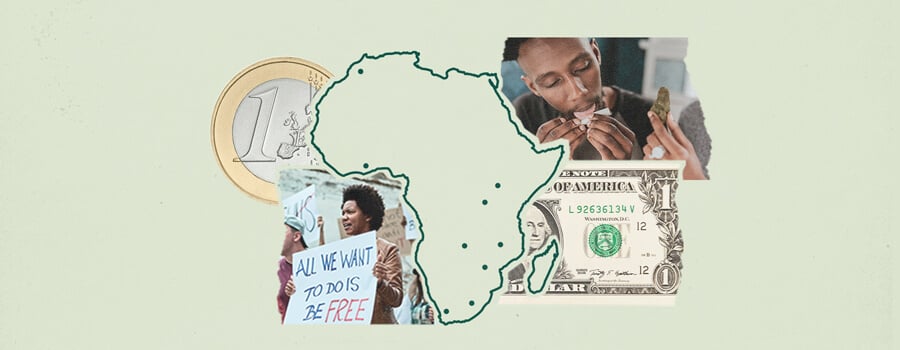
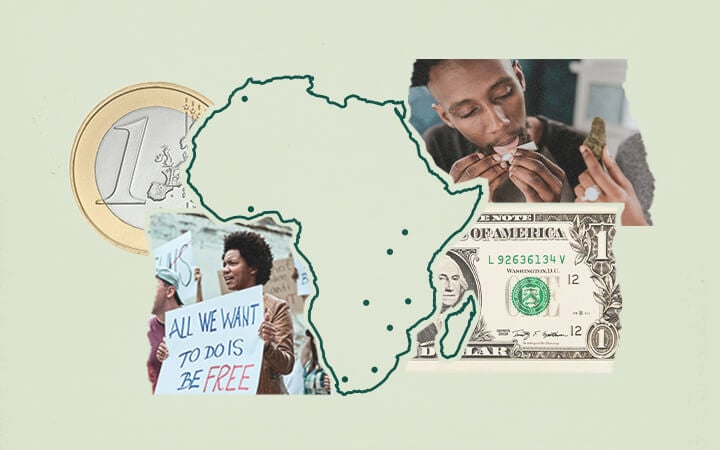
A Brief History of Cannabis in Africa
Africa is a large and diverse continent, and across it span myriad environments, cultures, peoples, religions, traditions, histories, and more. Attempting to give any kind of comprehensive overview of “African history” here is doomed to failure, and bound to reduce Earth’s second biggest continent to something much simpler and smaller than it really is.
So instead, here we will cherry-pick a few particularly interesting pieces of history that delineate how cannabis has been cultivated and used on the African continent.
But first, when did cannabis arrive in Africa? The plant is not indigenous, and at some point must have made its way there from Asia. It is certain that cannabis has been cultivated in North Africa for at least the last 1,000 years, but some evidence suggests that it was present in Ancient Egypt up to 5,000 years ago.
Interestingly, though Maghreb (Morocco, Algeria, Tunisia, Libya, and Mauritania) is perhaps the African region most associated with cannabis (specifically hashish), there is no evidence of hashish production there until 1921, making it a fairly recent tradition.
Though cannabis use has ebbed and flowed across the continent, it’s safe to say that the plant has been present and used there for quite some time.
Cannabis in Africa Today
Though rarely spoken about when cannabis legalization is discussed, there are nine countries in Africa that have, to some degree, legalized cannabis. In a later section, we will outline which countries these are and what the specific legal status of cannabis is in each. However, for now, it’s worth noting that recreational cannabis is only decriminalised in South Africa and not legal in any country (though it is tolerated in some), and that legalization revolves around medicinal use and production/export for economic gain.
Where cannabis is legal for these purposes, it requires licences and permits that must be bought from government bodies, which has led some to take a critical view of legalization in parts of Africa.
Problems Associated With Legalization
On the surface, legalization in Africa appears a boon for the countries where it occurs, conjuring images of local landowners and farmers cultivating cannabis and selling it on the international market. However, evidence suggests that in many, or even most, cases, the state of affairs is quite different, and that the cannabis industry in Africa can be viewed as a form of neo-colonialism—or canna-colonialism[1].
This problem occurs because, at least as of 2019, cannabis had not been legalized in African countries in the way you might think. It is not that laws were changed, making it legal to grow and sell cannabis, but rather that policy was changed, allowing corporations to buy licences to produce and sell cannabis in spite of prohibitive legislation. Therefore, to cultivate cannabis, growers must buy the right to do so—and this expense leaves most locals out of the equation.
In fact, using the examples of Lesotho and Eswatini, the policy changes took place only once the payments had been received and licences had been granted, suggesting lobbyism and bribery might be at work, rather than good policymaking.
Duvall states: “Foreign capital is being used to exploit the continent’s resources – land, water, labor, and cannabis – rather than to offer meaningful opportunities for Africans to accumulate wealth”.
To support this claim, he points to the fact that, aside from in South Africa, casual growers may not cultivate cannabis without risking legal persecution. In the Democratic Republic of Congo, government drug control policies were silently relaxed in favour of Canadian companies[2] that could profit from producing cannabis in the country; all the while, the same state supported and partook in violence against indigenous Congolese people who chose to cultivate the same crop.
What’s more, the intellectual and genetic property of Africa’s rich cannabis history appears to have been plundered so that European companies can profit from the production of African cannabis strains in Africa. Take Durban Poison and Power Plant: two cannabis cultivars famed for being “African landrace” strains. Evidence suggests that when IHU, a company cultivating cannabis in Uganda, chose to grow these strains, it bought and imported[3] them from Amsterdam, funnelling profits for African goods back into Europe.
The issue of so-called canna-colonialism is extensive and too deep to delve into properly here. However, it’s important to bear in mind that things are not always as they seem. When you read optimistic stories of legalization sweeping across Africa, you should question whether this benefits local Africans, or if it is in fact the work of pharma companies in the Global North seeking to exploit certain African countries' more corrupt systems of governance for their own gain. This is often at the expense of locals, and takes up valuable arable land that could be used to grow crops, or left wild.
So, the takeaway is this: in some African countries, what is touted as “legalization” is often an opportunity for countries from other continents to buy licences at relatively cheap prices, grow cannabis on land that is comparatively cheap compared European or North American land, and then export the product and profits back to the Global North.
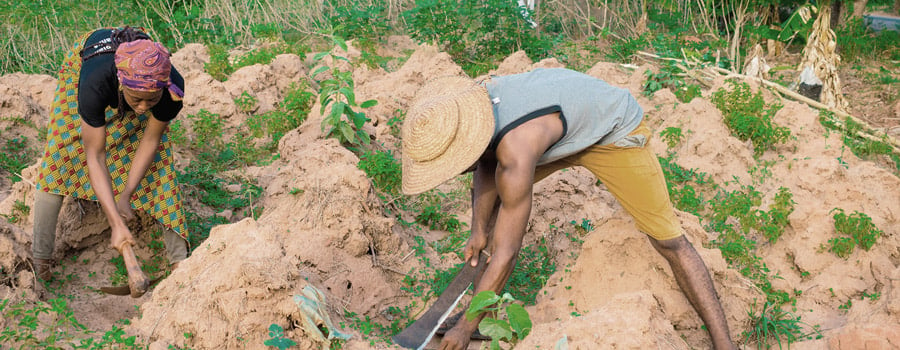
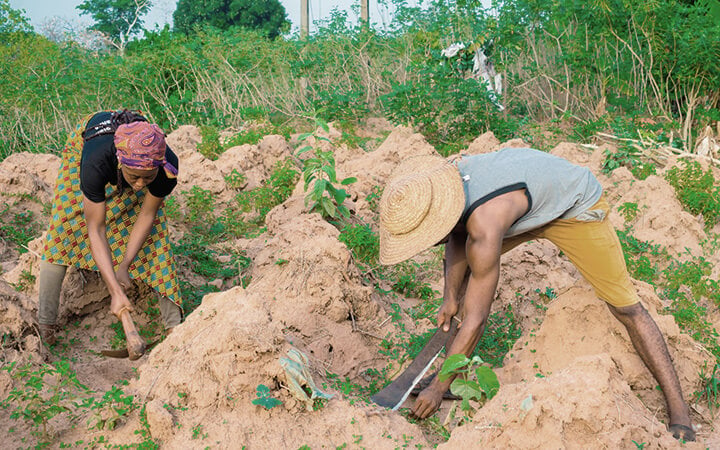
Where Is Weed Legal in Africa
With that in mind, let’s look at countries in Africa where cannabis has been legalized, or where it is possible for companies to buy licences and cultivate it locally.
- Lesotho: Since 2017, it has been possible to buy licences to grow and export cannabis for medicinal purposes.
- South Africa: Here, the cultivation of cannabis for personal use has been decriminalised since 2018. They are currently working on legislation that would allow for the legal production and sale of the plant.
- Zimbabwe: Here too, it is possible to buy licences that allow companies to grow, process, and export cannabis for medical and scientific purposes.
- Malawi: In 2020, Malawi passed the first set of laws aimed at creating a legal cannabis market, and it is now possible to cultivate, process, and use cannabis for medicinal purposes.
- Zambia: Licences can be purchased that allow for the cultivation and export of cannabis—it cannot be used for any purpose domestically.
- Uganda: In May 2023, cannabis was legalized in Uganda, when laws prohibiting it were nullified by the courts. Prior to this point, it had been legal to buy licences to grow and export for medicinal purposes.
- Morocco: A hotspot for illegal cannabis cultivation, consumption, and export, Morrocco legalized the production, sale, and use of medical cannabis in 2021. Recreational use remains illegal but widespread.
- Ghana: It is legal to cultivate and export cannabis in Ghana with a licence purchased from the Ministry of Health.
- Rwanda: Since 2021, it has been legal to produce and use cannabis for medical purposes here.
Cannabis in Africa: A Blessing and a Curse
As you can probably now see, the legal status of cannabis in certain African countries is not as straightforward as some would have you believe, nor is it so innocent as it may seem. However, that’s not to disempower those places where legislation is positive—opening the way to more acceptance surrounding cannabis use and opportunities for locals—but to point out that much of this so-called “legalization” may in part be exploitation by the Global North for the purposes of profit.
This article can only touch on the issue, and you shouldn’t walk away assuming that it has conveyed all there is to know about the state of affairs. Rather, its purpose is merely to raise important questions and considerations, and shed light on the continued ways in which European and North American countries and companies continue to exploit the African continent for their own ends.






































